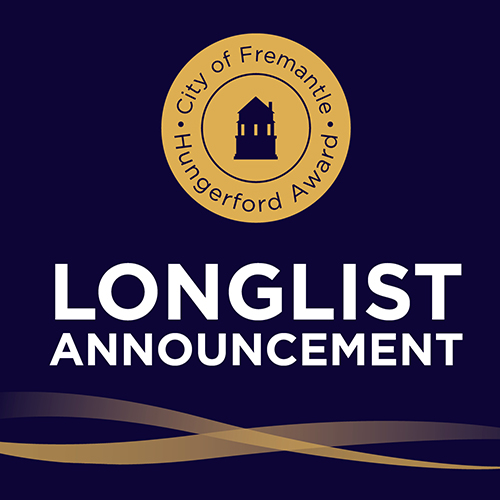Unveiling the 2024 Longlist: City of Fremantle Hungerford Award Shines a Light on Emerging Talent

Ten Western Australian writers are longlisted and in the running for the City of Fremantle Hungerford Award.
Judged anonymously, the City of Fremantle Hungerford Award is a biennial prize awarded to an unpublished manuscript by a Western Australian author for a work of fiction, narrative non-fiction or young adult fiction. The winner receives a cash prize of $15,000, a publishing contract with Fremantle Press and a hot desk fellowship with Centre for Stories.
The longlist was selected by a panel of judges comprised of Seth Malacari, Richard Rossiter and Marcella Polain, along with Fremantle Press publishers Cate Sutherland and Georgia Richter. Speaking on behalf of Fremantle Press, CEO Alex Allan said the longlist was chosen from a field of 81 manuscripts. Alex said, ‘The Award has a strong track record of discovering new writing talent and this year was no exception.’
The longlist includes six novels, one short story collection, two young adult novels and one work of narrative non-fiction.
The 2024 City of Fremantle Hungerford Award longlist is:
Chance and Necessity: A novel of Narrogin and Williams by Rosanne Dingli
The Memory Hour by Jane Ferro
Deeper Water by Helen Gladstones
Far From Wonderful by Howard McKenzie-Murray
Light Falling Like Stars by Samantha Murray
Screech by Jodie Tesoriero
I Remember Everything by Fiona Wilkes
A Tangle of Intentions by Amanda Williams
Nowhere, Everywhere by Annie Wilson
የተስፋ ፈተና / Trials of Hope by Yirga Woldeyes
The 2024 City of Fremantle Hungerford Award shortlist will be announced on 20 September on the Fremantle Press website and social media channels, with the winner announced on Thursday 24 October 2024.
Comments from the longlist judges
Seth Malacari
The manuscripts that made my longlist varied in genre, style, and theme, but they did have something in common: they were all original. These novels also had a strong voice, and I think this showed the authors passion for their work. These were stories that demanded to be told and those were the ones that captured my attention.
Marcella Polain
I know first-hand how difficult it is to write a novel-length manuscript, to summon the self-belief, carve out the time, sustain the effort. It’s demanding in every sense. It keeps us awake at night. It asks impossible questions. It hurts the body. It exhilarates, frustrates, surprises, confounds. So, it was a thrill to receive so many manuscripts to read – all that work in my hands!
For me, characters drive stories. Their choices make events. If the writer has succeeded in making characters seem real – complex, flawed, likeable (enough) – in other words, if I care about them, I will keep reading. If I’m intrigued enough by their dilemma – and there must be a dilemma – I can overlook small errors, inconsistencies, lapses. These can be remedied in editing. So, for me, emotional and psychological engagement is primary. When first approaching a work, as I read the opening and before (or perhaps, as) I gain any insight into character, I am acutely sensitive to language and voice. There needs to be a spark in the writing, a freshness in choices – no reliance on clichés in diction, setting, character or plot. This doesn’t mean genre fiction (which uses certain tropes) is precluded; it just needs to have an energy about it, a sense of authenticity, an assuredness. I don’t want to feel as if I’ve read it before. Overall, the writer should demonstrate they are largely in control of their material. And show me they are aware of the power of restraint.
There were many manuscripts set in colonial Australia – too many, I’d suggest – and, given the percentage of First Nations people in the overall population, a surprising number purporting to tell First Nations stories. Of course, as the entries arrived anonymously, it’s not possible for judges to know if these latter manuscripts raise ethical questions. There were also a good number in YA and genre-fiction. Those that affected me the most through voice and character, through restrained language and fresher choices in all their elements are still with me weeks – months – after reading them. A wonderful gift.
Richard Rossiter
A commonplace observation about (creative) written works across all genres is that they involve a search for meaning. I think this was evident in many of the entries in the 2024 Hungerford Award, fiction and non-fiction.
Frequently, lives were depicted in disarray, lacking cohesion, a sense of direction, a sense of belonging – to place, a social group, to family, to history. And so the search within the narratives often involved an attempt to overcome the apprehension of absence, of loss, most frequently at an interpersonal level within some sort of family structure. The notion of a nuclear family seemed particularly under threat, often with the father absent and, at times, a violent figure.
Implicitly – and at times explicitly – the central questions raised were Who am I? Where – and how – do I belong? Questions where the writer, and reader, were often deeply engaged in pursuing the answers. For me, the strongest entries were those where the gap between the narrating voice and the ‘story’ – or that which is being narrated – is minimal. There’s an intensity at work. The stories were frequently challenging, but all is not lost. Most often the narratives moved towards some sort of hard-won resolution of the issues that were raised, the difficulties posed, without appearing too simplistic or mere wish fulfilment.
A wide range of cultural and social groups was represented in the submissions, including Indigenous stories. Non-fiction works were a strong component. As a judge, reading such a sweep of powerful stories provides a glimpse into a rich multicultural Western Australia, the complexity of which may not always be evident in more quotidian manifestations.


